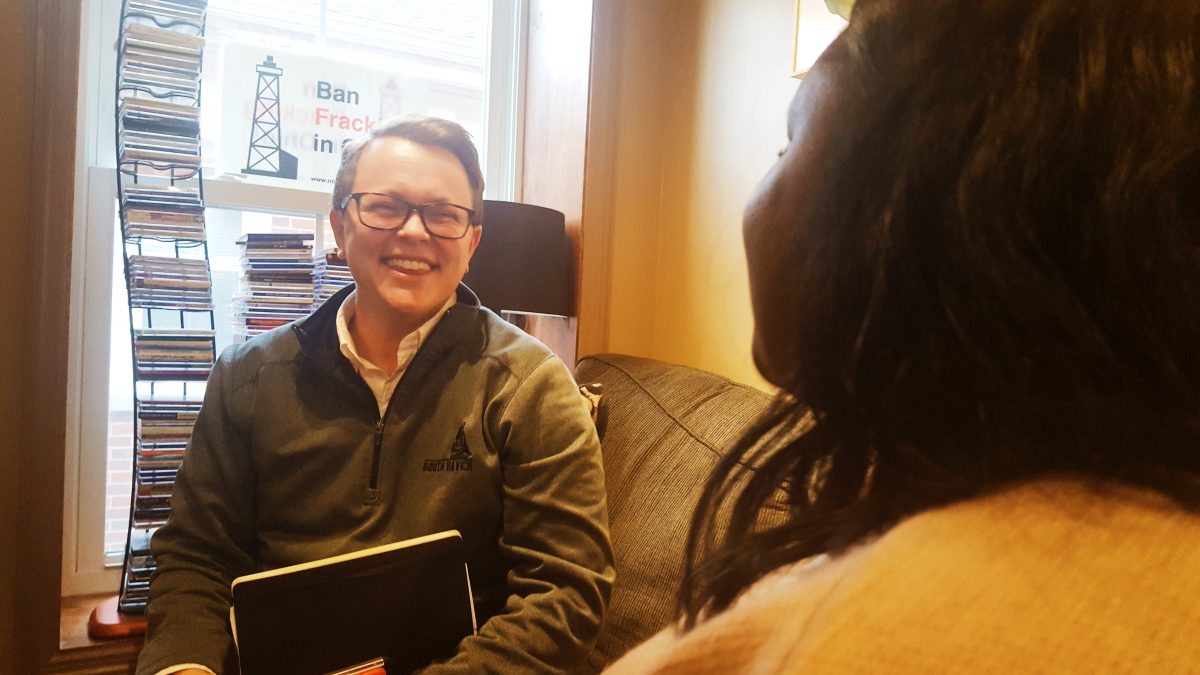
More than #Metoo: Queer Survivors and Sexual Assault
By: Kalila Bell, Kenyetta Whitfield
Posted on:
Sexual assault can be a traumatic experience. In our society, it can also be an incredibly hard thing for survivors to talk about—especially when they are members of a marginalized community. We sat down with two folks in Athens working to making the survivor experience just a little bit easier for those in the LGBT community.
Former Ohio University students Charlie Chadwick and Alyssa Ensminger know a thing or two about the realities of sexual violence. The two work at the Survivor Advocacy Outreach Program located in Athens and are responsible for a variety of different tasks all aimed to aid survivors and education on sexual violence and prevention.
“My role is to work at two smaller college campuses in the area, University of Rio Grande and Hocking College doing prevention and direct service work with students, faculty, and staff,” said Chadwick. “I also fill in doing our 7 county service area doing prevention education at Athens Middle School, programming at the SE Ohio regional jail among other things.”
That was Charlie. He plays an important role at SAOP but his dedication to work around sexual violence predates even his work at SAOP.
“I co-founded the organization fuck rape culture when I was in college it was…came from the ways sexual assault was treated on Ohio University’s campus,” said Chadwick. “That it wasn’t something that was taken seriously. That survivors weren’t getting the support that was needed and there wasn’t a strong prevention effort if any effort at all.”
Alyssa is also an employee at SAOP. She serves as a support advocate for the program.
“A majority of my job is either doing direct service or direct service programming,” said Ensminger. “I do a lot of direct advocacy with our clients throughout our service area I also sort of lead our medical partnership with O’bleness Hospital and increasing access to medical advocacy and accompaniment.”
The CDC’s National Intimate Partner and Sexual Violence Survey found that 44 percent of lesbians and 61 percent of bisexual women experience rape, physical violence, or stalking by an intimate partner, compared to 35 percent of heterosexual women. 40 percent of gay men and 47 percent of bisexual men have experienced sexual violence other than rape, compared to 21 percent of heterosexual men.
And those are just the stats for lesbian, gay, and bisexual people.
The 2015 U.S. Transgender Survey found that 47% of transgender people are sexually assaulted at some point in their lifetime.
Even with these statistics documented, those apart of the LGBTQ community seem to still be struggling to get the recognition they need during conversations about sexual violence. There also continues to be issues with representation.
“I think there is a really big misunderstanding in the general narrative not just lgbt, that sexual violence is a crime of power and control and that it does not have to do with actual attraction or sexuality,” said Ensminger
Looking at Athens, the solution to many of these misunderstandings could be solved through representation.
“With any identity that is oppressed in some way it’s really important to understand how you can support those survivors and the different needs that they have,” said Chadwick.
Unlike many who work in the world of sexual violence prevention and survivor advocacy, Charlie and Alyssa both identify as part of the LGBTQ community. For them, this means they are able to relate to some of the most marginalized clients that come to SAOP.
“At the survivor advocacy outreach program 2 of our 5 staff members are queer people one of which is a trans person,” said Ensminger. “Which is awesome.”
Their identities, however, are not the only things that make Charlie and Alyssa assets at SAOP. They also have a passion for helping those who’ve experiences sexual violence because it is a global issue.
“Honestly, I think it’s the realization that this has affected every single person in my life regardless of their gender, sexuality, age — anything,” said Chadwick. “It is a universal experience that you have either experienced yourself, have witnessed or you have perpetrated.”
While LGBTQ people continue to fight for representation in the sexual violence conversation there is still work being done in Athens to make sure queer survivors know there is help available to them.
“I can’t ever tell someone I understand what you’re going through,” said Chadwick. “So being able to kind of bridge I guess my shortcomings. To then be able to give someone a space where they feel safe and comfortable being their entire self and not feeling like they have to monitor the ways their interacting with me because of the identity I present as.”
While the national conversation has focused a lot of attention on straight women. Queer survivors of sexual violence not only exist, but also make up large portion of sexual assault survivors. Though it may not be on a national level, people like Charlie and Alyssa are helping serve this community and all survivors just by being available. For the Outlet, this has been Kalila Bell.

